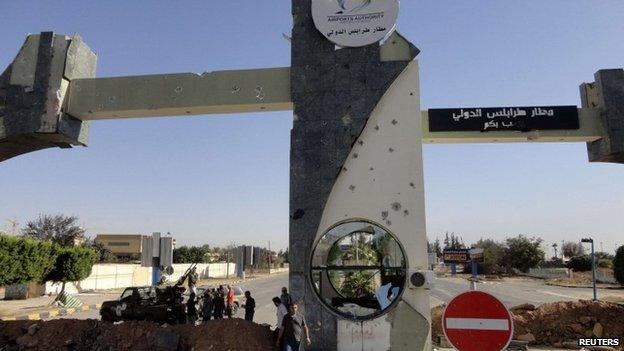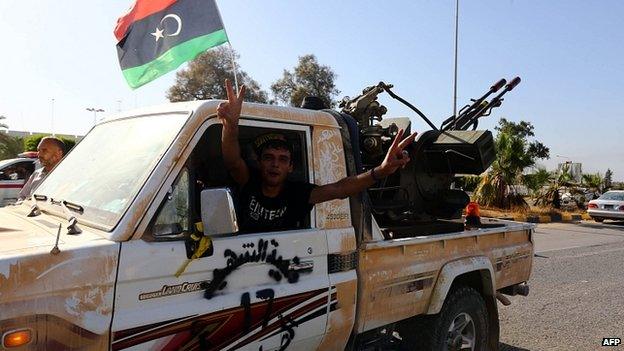Libya air strikes: Conflict linked to wider Middle East
- Published

Tripoli airport bears the marks of recent heavy fighting between rival militias
US allegations that United Arab Emirates (UAE) warplanes based in Egypt bombed Tripoli in recent days puts into stark relief the way in which the domestic conflict in Libya has been dragged into a wider crisis emerging in the Middle East.
The immediate cause of the incidents has been an intensifying dispute between Islamists and nationalists in Libya about legislative elections that created a new parliament in June.
The new House of Representatives was to replace the interim assembly, the General National Congress (GNC), elected in 2012.
Moderate Islamists fared far worse than they had in the previous elections and have been unwilling to accept the legitimacy of the new body.
Instead, they claim, the GNC, sitting in Tripoli is the only legitimate legislative body and the House of Representatives, sitting in Tobruk, over 1,000km (600 miles) to the east, is not.
GNC members are particularly opposed to calls by the new body for foreign intervention to improve security in Libya, where 350 militias have taken the place of the national army and police force.
Islamist advances
In Tripoli, the dispute erupted a month ago into a struggle to control the international airport.
The Libya Dawn alliance, which backs the Islamists, has just wrested control of the facility from the Zintan militia coalition, which supports the nationalists.

The Islamist fighters of Libya Dawn now completely control Tripoli
Libya Dawn, which is now in complete charge of the capital, was targeted by the raids. It regards the bombing as flagrant interference in Libya's internal affairs by the UAE - which has denied involvement.
Meanwhile, since June, a motley collection of militias, air-force units and army groups under a former general, Khalifa Haftar, has been trying to eliminate pro-Islamist and extremist militias in Libya's second city, Benghazi.
It has been relatively unsuccessful and Islamist militias there have forced out his key ally, the al-Saiqa elite army unit.
Despite this, Gen Haftar has warned that he would extend his campaign across north-western Libya. The bombing raids, which he claimed his forces had carried out, seem to be the harbinger of this.
Gunning for the Brotherhood
Whoever was behind the raids, other countries have always been involved in Libya's problems.
Britain, France, the US, the UAE and Qatar intervened in the 2011 civil war that toppled Col Muammar Gaddafi. Qatar has supported moderate Islamist groups since then.
That support has now drawn in other countries, too, for there is a wider crisis in the Middle East as well - the struggle to eliminate the Muslim Brotherhood as a political force in the wake of the Arab Spring and the July 2013 army-backed coup in Egypt.

Battle for Libya:
Misrata-led alliance (Libya Dawn):
Effectively in control of Tripoli
Includes some Islamist militias, such as LROR
Also Libya Central Shield
Called on former parliament, GNC, to reconvene
Zintan-led alliance:
Had controlled Tripoli airport for three years
Includes al-Qaqa Brigade and al-Sawaiq Brigade
Al-Qaqa had officially joined the national army but remained autonomous
Supports new parliament
Loosely allied with rogue General Haftar

Egypt, Saudi Arabia and the UAE have come together to confront the Muslim Brotherhood and similar groups wherever they appear - in Egypt, the Gaza Strip or Libya, for example.
The three anti-Brotherhood allies have also targeted Qatar, for its support for the Islamist groups they oppose, hence the raids on Tripoli.
Egypt has also denied being involved in the attacks, but it soon will be, simply because of its fears that radical Islamist militias in Benghazi will soon spill over its borders.
That is no doubt why Gen Haftar is a frequent visitor to Cairo. Indeed Egypt must also be very worried about the situation in the eastern town of Derna, where local extremists have declared a caliphate in imitation of the much-feared Islamic State - which controls swathes of Iraq and Syria.
Nor are the Egyptians alone, as Europe begins to worry that such extremism may soon cross the Mediterranean.